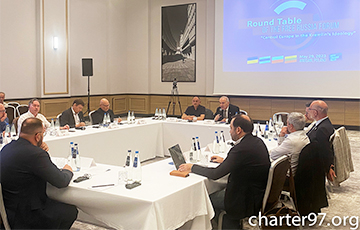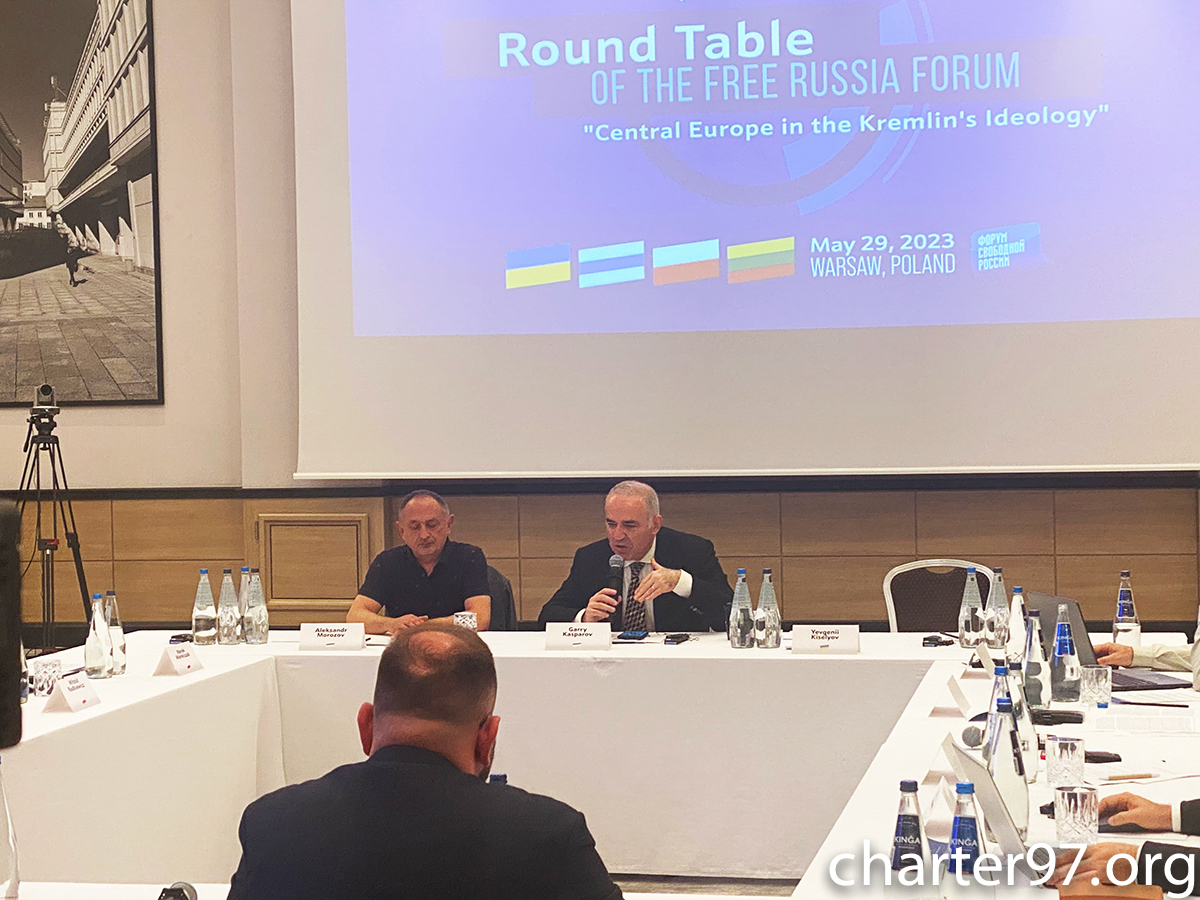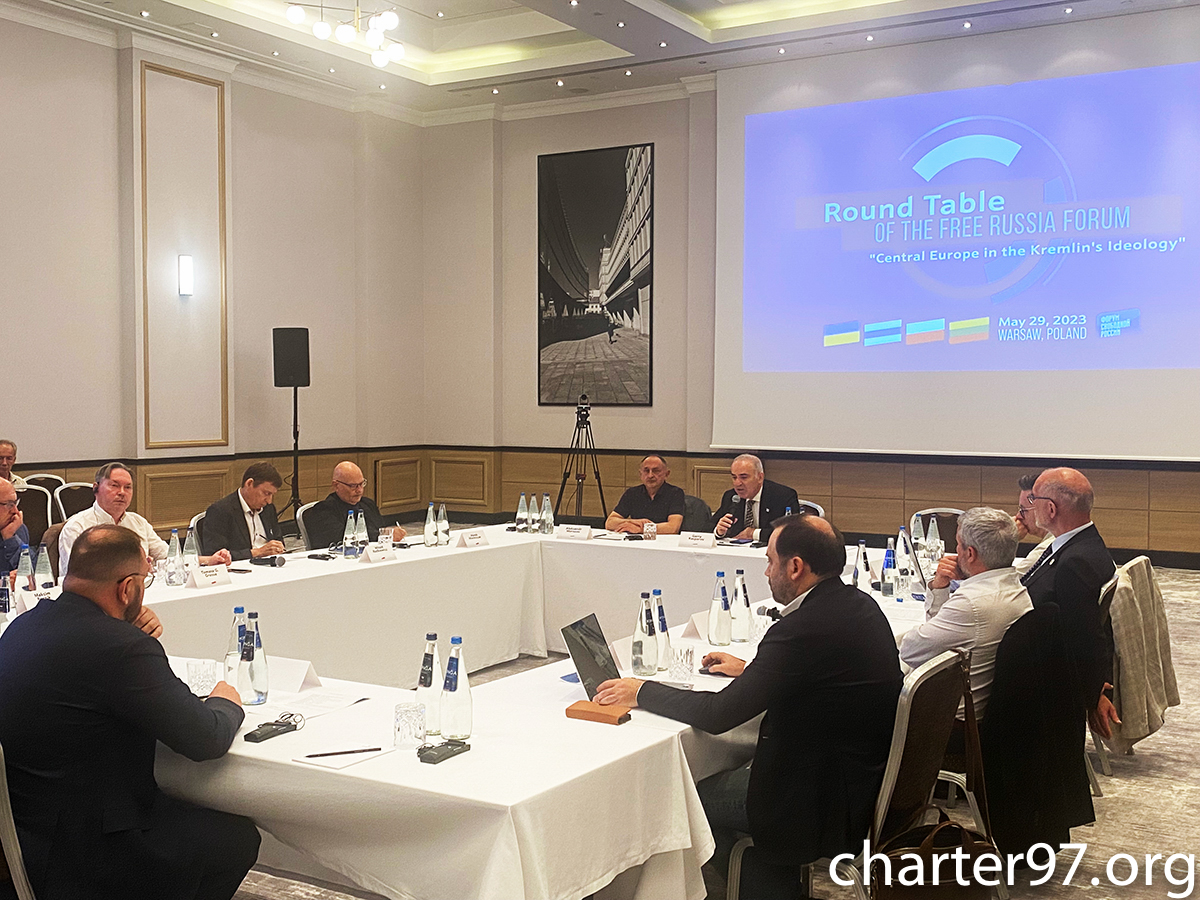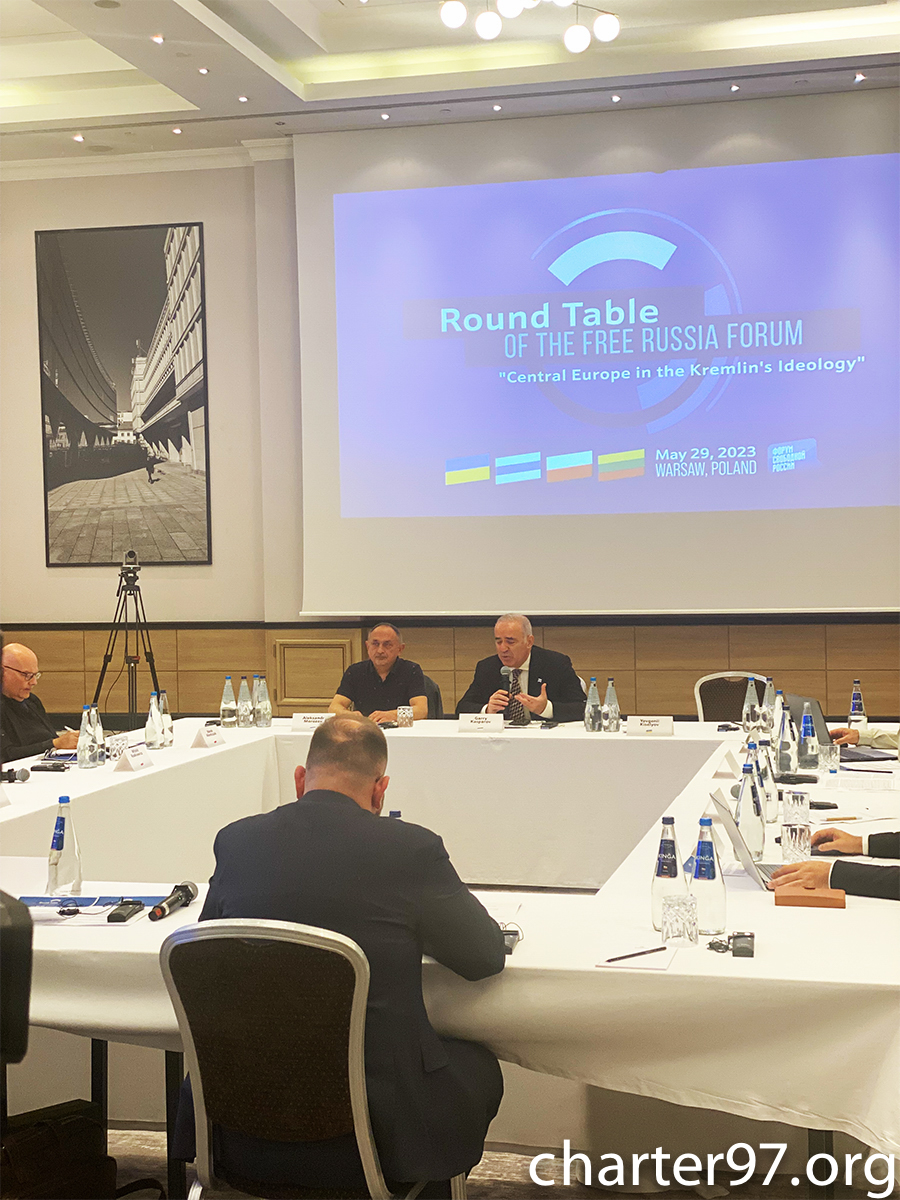‘We Need Complete Dismantling Of Putin Regime’
34- 30.05.2023, 14:42
- 21,306

How can the West respond to the Kremlin's imperial policy in Central Europe?
A round table organized by the Free Russia Forum was held in Warsaw. The name of the discussion is “Central Europe in the ideology of the Kremlin”.
The event, according to the correspondent of the Charter97.org website, was attended by Russian opposition politician and great chess player Garry Kasparov, Ukrainian journalist Yevhen Kiselev, Polish historian Marek Mienkiszczak, Russian lawyer Nikolai Polozov, ex-deputy of the Russian State Duma living in Ukraine Ilya Ponomarev and others. The mediator was Russian journalist Alexander Morozov.
Russian lawyer Nikolai Polozov drew attention to the deep roots of the Kremlin's expansionist policy towards Central Europe:
— The history of democratic Russia is very short. Practice has shown that democracy and imperialism in this country do not get along together. The empire is forced to maintain its viability by means of a repressive apparatus, extending it to the occupied territories and the peoples that are involved.
After the collapse of the USSR, there was an illusion in the West that the buffer non-bloc status of Ukraine and Belarus would allow normalizing the situation. Here, in Europe, “we can build democracy,” and we'll see how it goes in other countries. Somehow it will get better with time. It didn't get better though. Practice has shown that this Russian deep state inside the establishment is still the bearer of the imperial idea. In a favorable environment, these ideas take root and produce the fruits that we see today.

Polish historian Marek Mienkiszczak spoke about the main methods used by the Kremlin to influence the region:
— Firstly, with regard to Central Europe, it has been part of a plan in the strategy of Russian foreign policy over at least the past 20 years, which consisted of three elements.
First, to return the strategic control over the conditional post-Soviet space to Russia. Ukraine has always been absolutely the key element here. Ukraine is the center of Russian policy towards this area. The Kremlin was aware that without controlling Ukraine, any construction that concerns Russian policy will hang in the air.
Secondly, Central Europe is an attempt to create a buffer zone of security with the minimization or complete exclusion of the presence of allied forces, preventing the development of military infrastructure and maintaining leverage of economic influence.
As for the third important element, this is pushing the U.S. out of Europe. Especially in terms of military presence.
Marek Mienkiszczak believes that the West must respond harshly to the Kremlin's challenges:
— The goal of Western policy should be the change of the regime in the Russian Federation. Creation of prerequisites for this.
Former Deputy of the State Duma of the Russian Federation Ilya Ponomarev drew attention to the fact that there are weak links in the anti-Putin coalition:
— Some Western European countries are betting on negotiations with Moscow and an inertial de-escalation scenario in which the Putin regime will remain. We, the countries of Eastern Europe — Ukraine, Poland — are not satisfied with this. We need a complete dismantling of the Putin regime.
Russian opposition leader Garry Kasparov drew attention to the origins of the Kremlin's imperial policy in his speech:
— The current Russian elite, it seems to me, has become a hostage of historical lies, mythology, which dominated in the Soviet Union, the textbooks of which I studied. And it must be admitted that this lies, unfortunately, sometimes appeared even in Western textbooks.
Let's look at the attitude towards the Second World War, which in the Soviet Union was called the “Great Patriotic War”. It is very important that the Soviet Union always ignored the fact that Stalin was the same instigator of the war as Hitler.
Alas, the West resigned itself to this assessment. The war began on September 1, 1939, not June 22, 1941. Both Stalin and Hitler were aggressors, Stalin later attacked Poland, but this, of course, does not change the meaning. This is an attempt to bring the Soviet Union out of the category of countries guilty of unleashing the war, into the category of allies and, accordingly, forgiveness for all the crimes that the Stalinist regime committed in Eastern Europe, the de facto occupation of all of Eastern Europe for four decades, this largely created the background against which Russian revanchism grew.

One can understand the psychology of the Russian elite, according to Kasparov, by assessing the events of World War II:
— If for Europe the assessment is expressed by the words “never again”, then in Russia it is the words “we can repeat”. In general, what to repeat? Moreover, the historical myths that took shape had, as we know, a very dangerous power to capture the consciousness of people and, accordingly, dictated their behavior, which is based on an absolutely wrong assessment of the past. It is clear that during the Soviet Union the role of Lend-Lease and the allies was underestimated.
Today, I have the feeling that most even educated citizens of Russia are not exactly sure who fought in World War II. No one has conducted such a survey, but I have a suspicion that people will not believe at all that the USA and England were allies of the USSR. Moreover, this myth has created a completely wrong idea about the military power of the Soviet Union.
Even in the West today, many do not understand that without American help, in fact, without the presence of a second front, because the significant forces of the Third Reich were fettered precisely there, without Lend-Lease, without that incredible amount of assistance, the Soviet Union would not have survived the war.
The Battle of Stalingrad is the result of the incredible equipment of the Red Army at the expense of American supplies. 27 thousand cars, which allowed the army to be quickly transferred. Lack of understanding of how the war went on in general, the balance of power, created an illusion in the world. But it is interesting that this illusion worked in two directions. This myth about the “second-best army in the world”... I don't know where it came from. Did anyone ask the Chinese what they think about the “second-best army in the world”? I think that the situation is the same with the Turkish army, the Pakistani army, not to mention the Indian one.
But it seems to me that this myth that the Soviet army, the Red Army, has an undeniable advantage over any opponent on the battlefield, with the possible exception of the Americans, whom the USSR never faced in open confrontation, influenced the decision-making both in Russia and in the West.
The Russian oppositionist sees no prerequisites for the West to move away from these myths:
— Putin's impudence in solving the “Ukrainian issue” and the decision on full-scale aggression in February of last year was based on his belief that he could get away with it.
I'll tell you honestly, what everyone in Europe, in America expected would happen — Putin's troops would capture Kyiv. Zelensky would have accepted Biden's offer and left, Russian tanks would have entered Kyiv, the government of Medvedchuk or Yanukovych would have appeared. Let's be honest with ourselves, I say this at all conferences, today the same Western governments that help Ukraine would start negotiations with Putin's puppet government. Like, “What can we do? We are pragmatists.”
Yes, of course, they would have protested, but nothing really would have happened. Yes, maybe they would try to save some of the unoccupied parts of Ukraine, but they would play completely by Putin's rules.
The world was saved by the heroism of the Ukrainians and the leadership of Zelensky. No real action was taken by the West to prevent this tragedy. And that is why, when making a forecast for the future, one must understand that now the time has come when the collective West, everything that is located west of Poland and, of course, across the Atlantic, must finally learn these lessons and come up with some kind of concept.
Any option for ending this war without the complete liberation of the Ukrainian territories, including Sevastopol, reparations for this aggression and prosecution of war criminals, is a defeat for the free world. There are no intermediate stages here.
World War II did not end at the negotiating table. The American Civil War didn't end at the negotiating table either, because principles were at stake.
Next, we come to the question that is central to our discussion: is it possible at all to transform the Russian Empire into a state that can coexist in peace with its neighbors and be a full-fledged partner in the world of the twenty-first century? By the way, there is no clear answer to this question. Various scenarios are possible. But in order for such a chance to appear, a consistent position of the West is needed, in which it would be clearly stated that there can be no normal relations with the “Russia of the Future” until the conditions for the Ukrainian victory are met: the liberation of all territories, reparations, the bringing war criminals to responsibility. And only in this case, we can talk about the lifting of sanctions and the beginning of building new relations.












